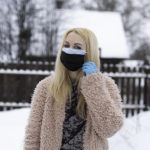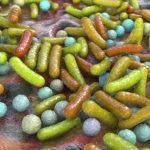By David Blyweiss, M.D., Advanced Natural Wellness
November 17, 2014
- Antibiotics don’t cure colds or flu
- Arm yourself with the strongest defense
- … And halt winter viruses in their tracks
Now that cooler weather has arrived across most of the U.S., more and more of my patients are coming in hacking and coughing from a cold or flu. Many of them have just arrived from their northern homes, looking forward to a nice warm winter in the Sunshine State.
Quite a few of them, unfortunately, were struck down by a cold-weather virus before they headed south. Their throats hurt, they’re tired of being sick, and almost all of them ask me the same thing: “Doc, I’m miserable. Can you give me an antibiotic to help get over this thing?”
A lot of these folks swear that antibiotics have cured a cold or flu in the past. But that’s not really the case.
You see, when you have a respiratory infection, it usually takes about 18 days before the cough disappears. But most people think their hacking should stop within seven to 10 days, tops. So, somewhere around the 12th or 13th day, they get worried. That’s when they head to their doc to demand an antibiotic.
When their cough disappears less than a week after starting the antibiotic, the patient is convinced the drug has worked its magic. The truth is, that cough would have disappeared on its own in the same matter of time.
Unfortunately, many mainstream doctors are quick to write a prescription for antibiotics, even though antibiotics do nothing to stop or cure viral infections like a cold or flu!
Open your arteries, improve blood flow for a new health miracle...
Did you know your circulatory system has over 60,000 miles of arteries, veins and other blood vessels, if stretched end to end?
But as you age, your blood vessels undergo changes, which may cause them to stiffen, thicken and get clogged.
GOOD NEWS! Doctors have now identified a “Miracle Molecule” inside your arteries that helps OPEN your arteries and IMPROVE blood flow.
It’s what Dr. Valentin Fuster calls it, "One of the most important discoveries in the history of cardiovascular medicine."To you, that means...
- Healthy blood pressure
- Sharper mind and memory
- Skyrocketing energy and muscular strength
- Increased pleasure and passion in the bedroom
- Improved circulation to every cell and organ in your body
Go here to discover a new natural way to significantly boost the levels of this miracle molecule in YOUR body NOW!
This is a problem, because the use of antibiotics adds to the development of antibiotic-resistant bacteria like MRSA and other “superbugs.” And later on – when you really need antibiotic treatment – it might not work very well.
Since antibiotics aren’t even close to the right solution when it comes to colds and the flu, what can you do to beat these viruses?
You’re always going to run into a winter bug somewhere along the way. That means your best defense is to arm your immune system so you’re better able to fight them off.
You can feed your immune system with a healthy diet that’s full of fresh, organic fruits and vegetables. Herbs like garlic, turmeric and green tea are also great additions to your diet. All of them have antioxidant activity that boosts immune response and makes you less likely to catch a cold or flu.
At the same time, it’s important to watch out for immune-suppressing refined sugars, processed carbs and saturated fats. These foods will defeat all the benefits of an otherwise healthy diet.
There’s a good reason why the foods you eat can affect your immune response. It’s because about 80% of your immune system lives in your digestive tract. Whole, natural, plant-based foods enhance your gut microbiota. Processed foods and saturated meats, on the other hand, derail this delicate balance of good and bad bacteria. In other words, every time you eat, you’re either feeding disease or fighting it.
That’s why it’s also a good idea to invest in a good probiotic to help beat seasonal bugs. They not only reduce your risk of catching one of these viral infections, they can also cut down the symptoms if you do acquire one. Look for a probiotic that contains multiple strains of Lactobacillus and Bifidobacterium. The more living colonies (CFUs), the more effective it will be.
Another way to keep your immune system up to par is by getting plenty of sleep. If you’re getting less than seven hours of snooze time every time your head hits the pillow, you’re basically issuing an invitation for a cold or flu to come in and take up residence. In fact, those short nights of sleep can make you about three times more susceptible to a cold. That being said, you should try to get somewhere between seven and nine hours of sleep every night.
Are You Suffering From...
- Love handles and a pot belly
- Romance that isn't what it used to
- Forgetfulness and inattention
- Low (or no) strength and endurance
- A sex drive that's shifted into neutral...or worse
If so...you may have Mature Male Burnout. Click here to discover more about this unique condition and what you can do about it.
I also recommend getting plenty of vitamin D. People who don’t get enough of this vital nutrient are more likely to get respiratory infections like colds and the flu.
Get outside midday, when the sun is at its strongest. Eat foods that are naturally rich in vitamin D such as salmon, shrimp, cod and shitake mushrooms, as well as vitamin D-fortified foods. And take supplements as well – I recommend 2,000 to 5,000 IU of vitamin D3 (cholecalciferol) in lieu of getting that flu shot!
But what happens if, despite your best efforts, you still get sick this winter?
You’ve done everything right. Your immune system is strong. But somehow, you still managed to pick up a particularly virulent bug somewhere along the way. Well, you can cut those symptoms short with a few of these time-honored remedies:
Flu: Elderberry is my top pick to get rid of the flu quickly. This herb practically stops flu dead in its tracks by blocking viral growth. And this is great news when it comes to recovery time. When flu sufferers take elderberry extract, it can reduce fever and other symptoms about four days quicker than if they didn’t take it. All it takes is a tablespoonful four times a day for five to seven days. And, don’t be fooled by lozenges and other “elderberry remedies.” Only the liquid extract works.
Colds: An herb called andrographis has been used medicinally for thousands of years. It’s particularly good for sinus and upper respiratory infections. That’s why it should be part of your arsenal when seasonal colds and viruses pay a visit. You can make the tincture into a tea and drink three to four times a day. Or, take it in capsule form, according to the label instructions.
Sore throat: Hacking and coughing during a cold or flu often leads to a sore throat. And, that aching throat is one of the main reasons people head to the doctor for antibiotics. If this is the case, goldenseal should be your first line of defense.
Goldenseal comes as a dried powder that can be added to water, along with a pinch of salt and used as a gargle. But a word of warning: It can be extremely bitter. If you can’t handle the taste, try taking it in capsule form.
Last, but not least, don’t forget about your mom’s or grandmother’s favorite remedy. Good, old-fashioned chicken soup. It really is good for colds. It turns out the ingredients help reduce the inflammatory response that triggers the release of mucus. And that’s really where a lot of cold misery comes from. All that excess mucus leads to stuffy nose, hacking, coughing and throat irritation.
When making your soup, use plenty of organic chicken, onions, sweet potatoes, turnips carrots, celery, parsnips and other veggies for maximum power.
Sources:
Ebell MH, et al. “How long does a cough last? Comparing patients’ expectations with data from a systematic review of the literature.” Ann Fam Med. 2013 Jan;11(1):5-13.
Josling P. “Preventing the common cold with a garlic supplement: a double-blind, placebo-controlled survey.” Adv Ther. 2001;18:189-93
Chen DY, et al., “Curcumin inhibits influenza virus infection and haemagglutination activity.” Food Chemistry, vol. 119, no. 4, pp. 1346–1351, 2010.
Matsumoto K, et al. “Effects of green tea catechins and theanine on preventing influenza infection among healthcare workers: a randomized controlled trial.” BMC Complement Altern Med. 2011 Feb 21;11:15.
Kang EJ, et al. “The effect of probiotics on prevention of common cold: a meta-analysis of randomized controlled trial studies.” Korean J Fam Med. 2013 Jan;34(1):2-10.
“Probiotics Are Found to Be a Secret Weapon for Fighting Symptoms of the Common Cold in College Students.” Press Release. University of Medicine and Dentistry of New Jersey. Oct 2012.
Schwalfenberg GK. “A review of the critical role of vitamin D in the functioning of the immune system and the clinical implications of vitamin D deficiency.” Mol Nutr Food Res. 2011 Jan;55(1):96-108.
Zakay-Rones Z, et al. “Randomized study of the efficacy and safety of oral elderberry extract in the treatment of influenza A and B virus infections.” J Int Med Res. 2004 Mar-Apr;32(2):132-40.
Gabrielian ES, et al. “A double blind, placebo-controlled study of Andrographis paniculata fixed combination Kan Jang in the treatment of acute upper respiratory tract infections including sinusitis.” Phytomedicine. 2002 Oct;9(7):589-97.
American College of Chest Physicians. “New Study Supports Chicken Soup As a Cold Remedy.” ScienceDaily. Oct 2000.






